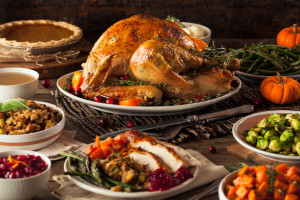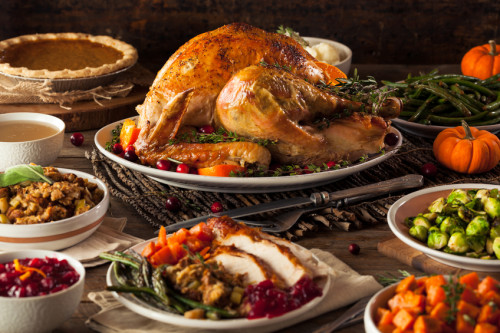Emotional eating and the holidays
The last two months of the year is a time that can bring up a range of emotions surrounding the holiday season like no other time of year. Joy, connection, meaning, celebration, reminiscing, and warmth . . . or endless pressure, unmet expectations, family triggers, anger, frustration, sadness, grief, loneliness and stress.
The truth is it is normal to experience a range of emotions over the holidays, all of which can contribute to emotional eating.
What is emotional eating?
Emotional eating is using food to make yourself feel better, even if you are not hungry.
It can be triggered by both positive and negative emotional experiences. Have you ever used food to celebrate, reward yourself, or as a pick-me-up after a hard day? Occasionally using food around celebrations, or as a quick boost isn’t necessarily a bad thing; the negative impacts of emotional eating happens when it becomes a persistent pattern of coping with negative and/or positive emotions.
With that in mind, it’s no wonder that the average person gains six to eight pounds over the holiday season.
So . . .
Do you just give in and mindlessly over-indulge yourself in a season filled with food, drink, and treats, at every turn?
Do you to take on lofty weight loss goals this holiday season?
Or, do you commit to a more balanced approach of being mindful of your eating throughout this holiday season?
What is mindfulness and what is mindful eating?
Mindfulness is the ability to slow down and pay attention to what is happening in the moment. In her blog post, “Mindfulness: What Is It and Is It for Me?”, Dr. Smitha Bhat describes that engaging in mindfulness requires three simple actions:
Slowing down
Paying attention with compassionate curiosity
Repeat
Mindful eating is one way of practicing mindfulness. In the book “Savor: Mindful Eating, Mindful Life”, Thich Nhat Hanh and Dr. Lilian Cheung said, “Mindful eating means simply eating or drinking while being aware of each bite or sip”. They go on to say, “Whenever we eat or drink, we can engage all our senses in the eating and drinking experience. Eating and drinking like this, we not only feed our bodies and safeguard our physical health but also nurture our feelings, our mind, and our consciousness”.
6 Tips for Mindful Eating Practice
Make a practice of pausing just prior to your meal – you can do this by focusing on your breath. This can be a time to get grounded, check in with yourself, and set intentions for mindful eating.
Take space away from distractions – find a comfortable spot to sit down away from the TV, phone, computer, work, or eating on the go.
Honor the food – take in a moment of gratitude.
Make an intentional choice to take smaller portions – using a smaller plate can help keep portions in moderation. Some find it helpful to imagine the plate in thirds to bring balance to portions (1/3 protein, 1/3 vegetables, 1/3 carbohydrates). Remember moderation, awareness, and balance is key.
Engage your senses and slow down – pause and take a moment to notice the colors, textures and smells of your food. What are the sounds in the room? What are you thinking and feeling? When you take your first bite of food or drink, pause before chewing or drinking and just notice the taste and textures in your mouth. Take pleasure in small bites, chew slowly and intentionally so that you can fully experience the taste and textures throughout your meal! One strategy to slow down is to put your fork or spoon down between bites.
Develop an attitude of self-compassion because you will get off track – be kind to yourself. You will not be perfect and you will not always make choices that you feel good about. That is okay. It will happen. You are human. If you can bring awareness to and notice what emotions or thoughts got you off track (e.g., hungry, angry, lonely, tired, stressed, or celebratory), and notice that with compassion, then you are increasing your self-awareness. And you can’t do something different if you are not aware! So congratulate yourself, and then focus on resetting your intentions and get back on track. The beauty of mindfulness is that each meal, and each food choice is a new opportunity to practice all over again.
Intentions and realistic goal setting
Intentions can help guide us in making healthier choices for ourselves. For example, say you have set intentions to make more balanced food choices, eat or drink in moderation over the holidays, or to move through the holidays without gaining weight. Then when you are faced with temptations around food or drink, can you pause and ask yourself, “Am I walking in a way that matches my intentions right now? If my intentions and actions matched right now, what might I be doing?” Those intentions can help guide your choices in the present. Do I have a second desert? Or do I choose to have just one and really take the time and space to enjoy and savor the experience.
When you are presented with temptations, treats, and food and drink galore, how do you want to move through those situations? What are your intentions this holiday season?
Remember to set realistic goals, be kind to yourself, and whatever you do, do it with increased awareness!
If you are feeling out of control with your eating, have developed persistent patterns of eating to cope with your emotions, experience disordered eating patterns, or feel that your issues are too big for the above strategies to help; counseling may be a helpful tool. Please talk to your doctor or Contact Us at (425) 269-3277 to see if counseling may be right for you.
By Paula B. Johnson, MS, LMHC
Executive Director, Centered Mind Counseling Services, PLLC


